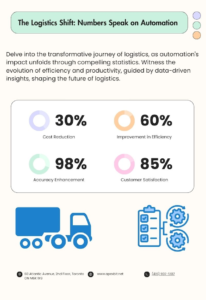Leverage Automation to Accelerate Logistics Processes, Reduce Costs, and Delight Customers
Automation : The Secret Weapon for Logistics Optimization

In the fiercely competitive realm of logistics, innovations that streamline operations, slash costs, and elevate customer satisfaction are invaluable. Enter Robotic Process Automation (RPA), a transformative force revolutionizing tasks with unmatched efficiency and accuracy. Through key use cases, we’ll explore how automation, powered by RPA, is not just a technological leap but a practical tool for real-world challenges, making logistics operations smoother, faster, and more reliable.
Introduction
In an era where efficiency defines success, the logistics industry has embraced automation as its champion. Imagine a digital workforce, tirelessly operating round-the-clock, tackling the most tedious tasks with precision. Automation, through RPA, is revolutionizing logistics by taking over routine tasks, freeing human workers to focus on more strategic endeavors. This post will delve into how automation is significantly enhancing logistics in core areas, underscored by vivid examples and compelling statistics.
How Automation Makes a Difference in Logistics
Automation isn’t just a buzzword; it’s a robust tool fighting the traditional challenges of logistics operations. From inventory management to order processing and invoice handling, the influence of automation is growing, yielding tangible benefits.
Streamlining Inventory Management
The Challenge:
Inventory has to be monitored and maintained by manufacturers and suppliers in order to ensure that they have enough material to meet customer demands. Need to take real-time reports to optimize inventory needs.

Automation to the Rescue:
- Automated Stock Updates: Continuous monitoring of stock levels ensures real-time updates, minimizing the risk of discrepancies.
- Demand Forecasting: By analyzing past sales data to predict future demand, automation keeps inventory aligned with market needs.
The Impact:
Companies leveraging automation for inventory management report up to a 50% reduction in inventory-related tasks and a significant increase in accuracy, virtually eliminating stock issues.
Efficient Order Processing:
The Challenge:
Order Processing is performed by manual entry of the customer information in companies’ database, processing payment, sending an email confirmation and placing order.

Automation to the Rescue:
- Quick Data Entry: Automation dramatically shortens order processing times by swiftly entering order details into systems.
- Seamless Coordination: Digital workers optimize order fulfillment by assigning orders to the most suitable warehouse and arranging shipping, streamlining the process.
The Impact:
Organizations using automation report order processing times cut by up to 70%, significantly boosting customer satisfaction and reducing logistical bottlenecks.
Automating Invoice Processing
The Challenge:
One of the major challenges for businesses is getting paid after the job is done. The regular follow-ups and multiple systems in the process can make it slower. RPA can integrate multiple systems to streamline the process. RPA can integrate with freight bill payment systems to automate complete order-to-cash process for hundreds of large 3PL carriers.

Automation to the Rescue:
- Instant Invoice Creation and Sending: Automation allows for the automatic generation and dispatching of invoices, significantly reducing delays.
- Quick Reconciliation: Bots efficiently match invoices against purchase orders with minimal human intervention, swiftly identifying discrepancies.
The Impact:
Invoice processing automation has enabled companies to reduce costs by up to 60% and cut processing times by 75%, boosting efficiency and improving vendor relations.
“Embrace automation to transform logistical challenges into opportunities for efficiency and growth, setting a new standard for innovation and customer satisfaction in the industry.”
The 24/7 Advantage
Imagine operations running seamlessly 24/7, without constant human oversight. Automation makes this possible, working tirelessly to ensure uninterrupted workflow and quick adaptation to market changes.
Wrapping Up: The Simple Truth About Automation
Automation, underpinned by RPA, is revolutionizing the logistics industry by taking on tedious tasks, allowing humans to focus on problem-solving and innovation. As we progress, automation stands as a testament to faster, cost-effective, and more reliable logistics operations.
The Future Is Automated
The logistics sector is entering a new era marked by automation, driving efficiency, innovation, and growth. The evolving capabilities of automation in logistics forecast a future of more efficient, accurate, and resilient operations, adaptable to changing market dynamics. Integrating automation into logistical processes prepares companies not just for today’s challenges but for tomorrow’s opportunities.
Navigating Challenges with Automation: Beyond the Basics
As businesses explore the depths of automation’s potential, they find it capable of addressing complex challenges. Beyond basic tasks, automation is pivotal in enhancing data analysis, optimizing route planning, and managing customer inquiries, signifying its growing influence and shaping the future of logistics in exciting ways.





Recent Comments